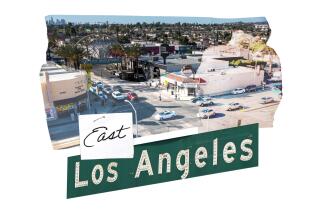NORTH TUSTIN : 6,000 Residents Turn In Application for Cityhood
- Share via
A residents group seeking to form the city of North Tustin submitted more than 6,000 signatures Wednesday along with an application for cityhood.
Jim Colangelo, executive officer of the Local Agency Formation Commission, said that a public hearing on the proposal probably will be held in April, assuming the registrar of voters verifies that there are at least 4,533 valid signatures of registered voters.
If the commission approves the incorporation, it would be on the ballot in November, Colangelo said.
Marvin Rawitch, a proponent of incorporation, said about 115 members and supporters of Citizens for More Local Control have been collecting residents’ signatures for the past three months and will continue to collect more.
“We want to let the commission know that we think there is an overwhelming support for this in the community,” Rawitch said.
Incorporation proponents say that creating a new city would give residents political autonomy and help maintain the semi-rural atmosphere of much of the area more effectively than annexation to Tustin and Orange.
Some North Tustin residents disagree, however, and would prefer to annex to adjacent cities or remain unincorporated.
Letter-writers to local newspapers have debated the issue for several months, some of them criticizing a feasibility study that was released last summer.
While that study indicated that an annual utility users tax of $73 per household would be required, a new, more comprehensive study found that no new users tax would be required until the city’s ninth year, said Michael Bannon, a consultant with Christensen & Wallace of Oceanside, the firm that prepared the study. At that time, the tax would be the equivalent of $74 today, Bannon said.
The new city would be able to delay putting the new tax into place because of funding from Measure M and additional gas tax revenue through Prop. 111, Bannon said.
“The financial picture is even brighter in the comprehensive study than in the initial study,” Rawitch said.
Phyllis Spivey, an opponent of incorporation, was one of those who criticized the initial study for not including a capital improvement program or other necessities.
“There were major problems with the preliminary study and I suspect there will be major problems with this one as well,” said Spivey, who had not seen the new study yet.
More to Read
Sign up for Essential California
The most important California stories and recommendations in your inbox every morning.
You may occasionally receive promotional content from the Los Angeles Times.










